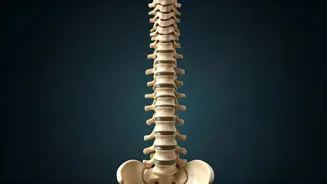Bone and Muscle
Vitamin D deficiency can significantly affect bone and muscle health. One of the most noticeable signs is bone pain, as vitamin D aids in calcium absorption,
which is essential for bone strength. Without enough vitamin D, bones can become weak and prone to fractures. Muscle weakness is another common indicator, as vitamin D receptors are present in muscle tissues, impacting their function. This can lead to difficulty with everyday activities and increased fatigue. Additionally, people might experience bone tenderness, making even light pressure uncomfortable. It is important to recognize these initial signs, so that appropriate measures can be taken, and the impact of the deficiency can be minimized.
Mood Changes
The role of vitamin D in mood regulation is often underestimated. Several studies suggest a link between low vitamin D levels and mood disorders, especially depression. Individuals with a deficiency may experience feelings of sadness, hopelessness, and a general lack of interest in daily activities. Vitamin D affects the production of serotonin, a neurotransmitter that influences mood. Reduced serotonin levels can exacerbate symptoms of depression. Seasonal Affective Disorder (SAD) is another manifestation, as reduced sunlight exposure during specific seasons lowers vitamin D synthesis, leading to mood changes. If you're experiencing persistent low mood, checking your vitamin D levels can be crucial for an overall health assessment.
Fatigue and Tiredness
Unexplained fatigue and tiredness are often among the initial signs of vitamin D deficiency. The body needs vitamin D for various metabolic processes, and insufficient levels can lead to reduced energy levels. This isn't just feeling a little sleepy; it's a persistent sense of weariness that doesn't improve with rest. You might find yourself feeling tired even after a full night's sleep or experiencing a lack of energy throughout the day. This chronic fatigue can impair daily activities and significantly affect quality of life. If tiredness is a consistent problem, assessing your vitamin D status could provide helpful insight.
Frequent Illnesses
Vitamin D plays a pivotal role in the immune system, making it essential for warding off illnesses. Low levels can weaken your immune defenses, leaving you more vulnerable to infections like colds, flu, and other ailments. Frequent bouts of illness, with longer recovery times, may indicate a deficiency. Vitamin D helps regulate immune cells, which combat viruses and bacteria. Insufficient vitamin D hinders the ability of these cells to function properly. If you frequently experience infections or find yourself constantly unwell, getting your vitamin D levels checked could provide crucial details about your health.
Hair Loss
While there can be multiple causes for hair loss, vitamin D deficiency is sometimes a contributing factor. Low levels of this vital vitamin can disrupt the hair growth cycle, leading to shedding and thinning. Hair follicles, which are where hair grows, have vitamin D receptors. When the supply of vitamin D is inadequate, these follicles can become less effective, potentially leading to hair loss. Hair loss, especially when accompanied by other symptoms like fatigue or mood changes, can be a sign of low vitamin D levels. Consulting with a healthcare provider is beneficial to determine if vitamin D deficiency is the cause of hair loss.
Slow Wound Healing
Vitamin D is important for the wound-healing process in the body. The vitamin is essential for several steps involved in healing cuts, scrapes, and surgical incisions. When vitamin D levels are low, it can lead to slower healing of wounds. This occurs because vitamin D helps to regulate inflammation, which is a critical part of the healing process. Insufficient vitamin D can impair the body's ability to produce new tissues to repair the damage. Noticeable delays in wound healing might be a sign that your vitamin D levels need attention. Proper assessment of vitamin D status can help optimize the healing process and support overall health.
Muscle Cramps
Muscle cramps and spasms can also indicate a vitamin D deficiency. Vitamin D helps regulate calcium and phosphorus levels in the blood, which are both necessary for healthy muscle function. Deficiencies can disrupt this balance, leading to painful muscle contractions. Muscle cramps, especially in the legs or back, can be a symptom of low vitamin D. These cramps can occur at night or after physical activity, causing discomfort and disrupting sleep. Getting a vitamin D assessment can help to uncover the root cause of these cramps and assist in determining the course of action to relieve them.
Digestive Issues
Vitamin D's impact extends beyond the more commonly recognized signs. Digestive problems can occur because vitamin D plays a role in maintaining the health of the gut. Conditions such as Crohn's disease and celiac disease can impair the absorption of vitamin D, potentially worsening the deficiency. Individuals with digestive issues might find that their symptoms worsen when vitamin D levels are low. Symptoms might range from abdominal pain and bloating to constipation or diarrhea. Addressing vitamin D deficiency could provide benefits to the digestive system, which could improve digestive health.
Excessive Sweating
Excessive sweating, particularly on the forehead, is sometimes recognized as a symptom of vitamin D deficiency, mainly in infants and young children. Though not a universal sign, it's a more common symptom in those with low levels. This sweating is often unrelated to physical activity or high temperatures, and may happen even when the environment is cool. This phenomenon arises from an impaired ability to regulate body temperature due to vitamin D's role in calcium absorption. While not as widely recognized as other signs, excessive sweating can still be an indicator of possible vitamin D deficiency.
Weight Gain
Vitamin D deficiency may play a role in weight gain and metabolic issues. While not a direct cause of weight gain, low vitamin D levels might be associated with an increased accumulation of body fat. Vitamin D can influence the function of fat cells and how they store energy. Insufficient levels can impair metabolic processes, leading to increased fat storage. Addressing vitamin D deficiency alongside a healthy lifestyle can help to ensure weight management efforts are effective. It’s crucial to check vitamin D status to ensure any measures for overall health and well-being are effective.













